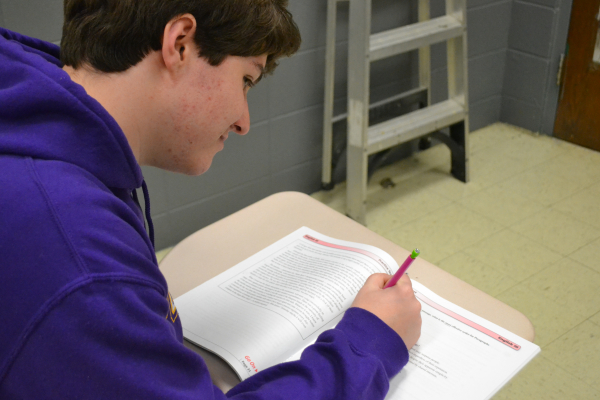Students Prepare For State Mandated End-of-Course Testing

STUDENTS PREPARE FOR STATE END OF COURSE TESTING — Students and teachers make preparations to review for the upcoming state exams.
April 7, 2017
Over half of the school year has passed at Central High School, each day bringing students and teachers closer to the conclusion of another productive year. The fast-approaching summer vacation is an indicator of how quickly time flies when students are working diligently to prepare for the next school year. With that in mind, the school must acknowledge and assess the upcoming state tests.
“State testing does two things: first, it creates a standard way to measure student growth. Without state testing, it is very likely that some schools would give their students a very easy test to make look like their students were better than they really are. Second, state testing gives the state’s Department of Education a way to grade teachers and schools on their effectiveness. Although, in most teachers’ opinions, it is definitely not a good way to determine who is an effective teacher,” explained English 10 teacher, Mr. Kevin Parsons, who was in charge of this year’s testing.
In past years, the Hamilton County Department of Education mandated when each test was going to take place. However, this year, they allowed schools to decide some of the official examination dates, so that the testing will better fit the school schedule.
There are some students that do not see the significance of participating in assessments provided by the Department of Education. Misconceptions about state testing can range from the idea that they are a waste of time, to the belief that they will not affect one’s success in the future. Despite the fact that a single grade does not determine one’s entire future, state tests help guide students to their desired career path, and evaluate which areas students need to focus on and improve. Another reason why students should take state testing seriously is because their scores will reflect their teachers’ and their school’s reputation. Most students are conscious of their GPA, so they are determined to make positive scores on the test to maintain excellent grades.
“I teach every day. We will do a practice test, but the current ELA (English and Language Arts) test is mostly dependent upon reading skills,” revealed Parsons “I have been working all year to improve my students’ reading comprehension. If I am being honest, I’m not really doing this for the state test, though. I’m doing it for the kids.”
The testing dates are as follows:
- April 18: English 10 and 11
- April 19: ACT (Juniors)
- April 20th: U.S. History and English 9
- April 24-25: English 9 and 10
- April 26: Algebra I
- April 27: Geometry and U.S. History
- April 28: Biology and Chemistry
- May 1: AP Psychology, AP Chemistry, and Algebra II
- May 2: Algebra I and English 11
- May 3: English 11 and Geometry
- May 4: Algebra II
- May 5: Make-up Day
A calendar view of the testing dates can be viewed here.
Upon completion of the end-of-course exams, students and teachers will be notified of their results by the end of May.




